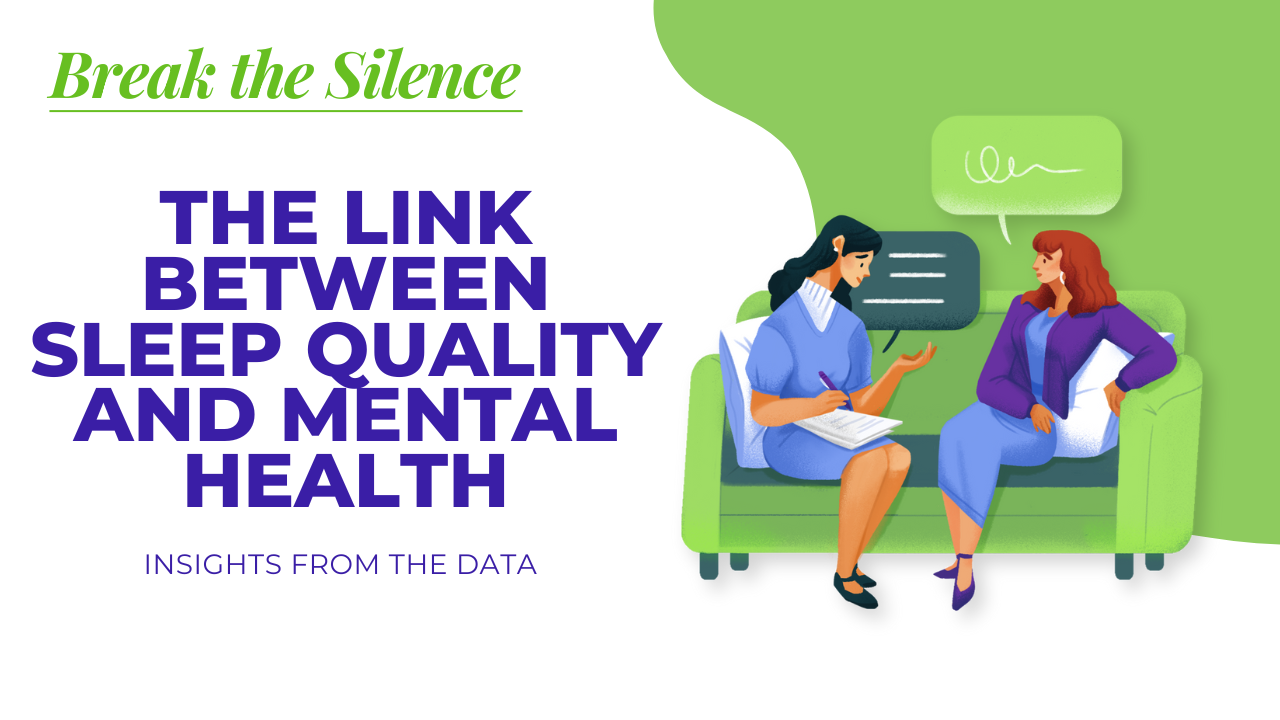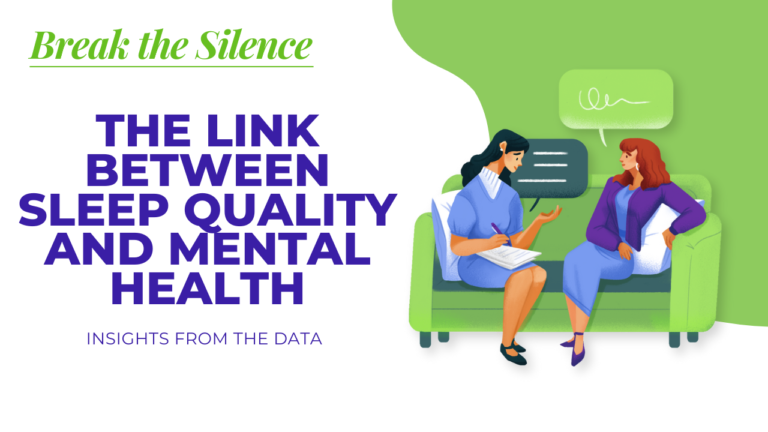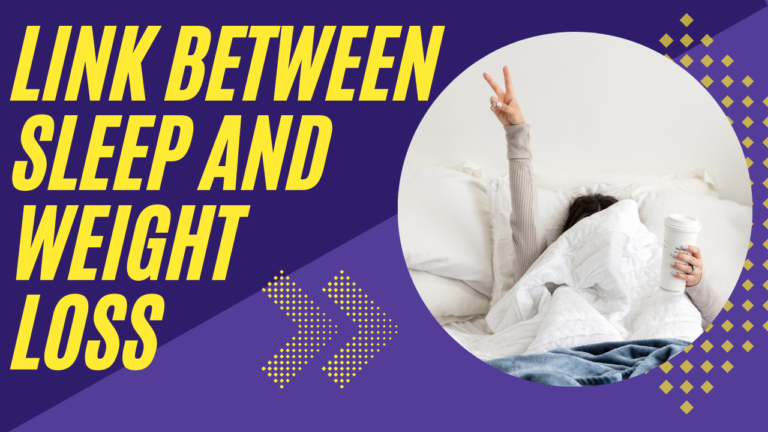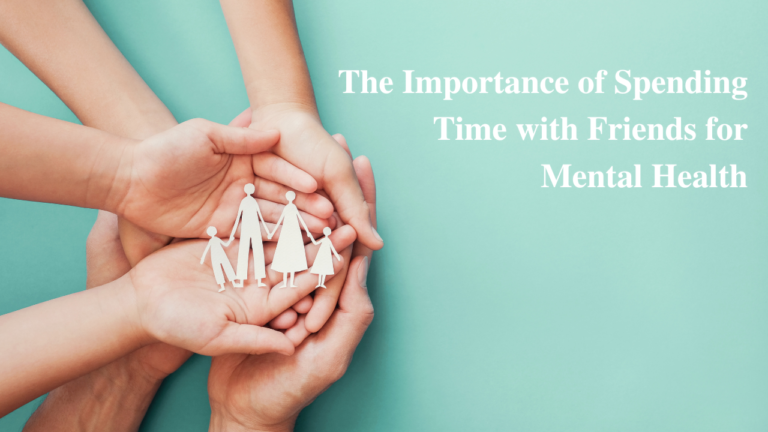
Introduction
In today’s fast-paced world, sleep often takes a backseat as we juggle work, social obligations, and daily stressors. However, an emerging body of research highlights a crucial connection between sleep quality and mental health. Poor sleep doesn’t just leave you feeling groggy—it can significantly impact your mood, cognitive function, and overall psychological well-being. In this blog post, we will explore the link between sleep and mental health, diving into data-backed insights that underscore the importance of good sleep habits for a healthy mind.
Why Sleep Matters for Mental Health
Sleep is a fundamental biological process that helps the body and brain recover, consolidate memories, and restore energy. However, sleep is not just important for physical health; it is equally essential for mental well-being. Data suggests that poor sleep quality is linked to a range of mental health issues, from anxiety and depression to cognitive decline.
Key Findings from Recent Studies:
- Sleep Deprivation and Mental Health Disorders: Research has shown that individuals who experience chronic sleep deprivation are at a higher risk of developing mood disorders, including anxiety and depression. A study published in the Journal of Clinical Psychiatry found that 70% of patients with depression reported poor sleep quality. Furthermore, those with insomnia are more likely to experience an onset of depressive symptoms.
- Sleep and Cognitive Function: Sleep is critical for cognitive function, including memory, problem-solving, and emotional regulation. A 2021 study from the National Institute of Health found that disrupted sleep patterns can impair cognitive abilities, leading to problems with concentration, decision-making, and emotional stability.
- The Role of REM Sleep: Rapid Eye Movement (REM) sleep, the deepest stage of sleep, plays a vital role in emotional processing and memory consolidation. A lack of REM sleep can lead to increased emotional sensitivity and difficulty managing stress, both of which contribute to mental health challenges.
- Sleep Duration vs. Sleep Quality: While the general recommendation is to get 7-9 hours of sleep per night, the quality of sleep matters just as much as the duration. Studies show that even individuals who spend a full 8 hours in bed may experience poor mental health if their sleep is fragmented or interrupted.
How Poor Sleep Affects Mental Health
Understanding the mechanism behind how poor sleep impacts mental health is critical. Let’s explore the physiological and psychological effects of inadequate sleep:
1. Increased Stress and Anxiety:
Sleep deprivation activates the body’s stress response system, increasing levels of cortisol, the hormone responsible for stress. High cortisol levels are directly linked to feelings of anxiety, irritability, and heightened emotional responses.
2. Depression and Sleep Disorders:
There is a well-established bidirectional relationship between depression and sleep disorders. People with depression are more likely to suffer from insomnia, and those with chronic sleep problems are at a higher risk of developing depression.
3. Memory and Emotional Regulation:
Insufficient sleep disrupts the brain’s ability to process emotions effectively. Sleep disturbances can cause heightened emotional reactivity, leading to problems such as irritability, mood swings, and difficulty coping with stress. Additionally, sleep is vital for memory consolidation, and poor sleep impairs the ability to retain and recall important information, affecting overall cognitive function.
The Benefits of Improving Sleep for Mental Health
Improving sleep hygiene and ensuring you get quality rest can have a significant positive impact on mental health. Here are some of the benefits of prioritizing good sleep:
- Reduced Anxiety and Stress: Better sleep can help regulate stress hormones and reduce feelings of anxiety. A study from the American Psychological Association showed that individuals who improved their sleep quality experienced significant reductions in anxiety levels.
- Improved Mood and Emotional Stability: People who sleep well tend to have better mood regulation and more stable emotions. Sleep allows the brain to process emotions, reducing the risk of mood disorders like depression.
- Enhanced Cognitive Function: Restorative sleep enhances cognitive abilities, including focus, decision-making, and problem-solving. A well-rested mind is better equipped to handle daily challenges and stressors.
- Better Resilience to Mental Health Struggles: Quality sleep can improve mental resilience, helping individuals better cope with emotional and psychological challenges. Sleep fosters an optimal environment for emotional recovery, ensuring that mental well-being is supported.
Practical Tips for Improving Sleep Quality
To reap the mental health benefits of sleep, it’s important to focus on enhancing sleep quality. Here are some evidence-backed tips for improving your sleep hygiene:
- Establish a Consistent Sleep Schedule: Going to bed and waking up at the same time every day helps regulate your body’s internal clock, leading to improved sleep quality.
- Limit Screen Time Before Bed: The blue light emitted by phones, tablets, and computers can interfere with melatonin production, a hormone responsible for regulating sleep. Avoid screens for at least an hour before bedtime.
- Create a Relaxing Bedtime Routine: Engage in calming activities before bed, such as reading, meditating, or taking a warm bath, to signal your body that it’s time to wind down.
- Optimize Your Sleep Environment: Ensure your bedroom is quiet, dark, and cool. Investing in a comfortable mattress and pillows can also make a significant difference in sleep quality.
- Exercise Regularly: Regular physical activity can improve sleep quality by promoting deeper and more restorative rest. However, avoid vigorous exercise too close to bedtime.
Conclusion
The connection between sleep quality and mental health is undeniable. Poor sleep can contribute to a range of mental health issues, including anxiety, depression, and cognitive impairment. Conversely, improving your sleep quality can enhance emotional well-being, cognitive function, and resilience against mental health challenges. By prioritizing sleep and implementing healthy sleep habits, you can protect and nurture your mental health for long-term wellness.
Call to Action: If you’re struggling with sleep or mental health issues, it may be helpful to consult with a healthcare professional. Taking steps toward improving your sleep is an investment in your mental well-being!
Keywords to Rank for:
- Sleep quality and mental health
- Impact of poor sleep on mental health
- Sleep disorders and mental health
- Improve sleep quality for better mental health
- Connection between sleep and anxiety
- Sleep hygiene tips for mental health

















